By Sadie Fowler
The selection of judges for the Tennessee Walking Horse National Celebration is a process requiring layers of factors and careful planning by those behind the hiring. This year’s panel serves as a great example of what goes into that decision and why the panel is primed up with the potential to be a great one.
The significance of the panel at large as well as the skill of each judge individually is a hugely significant part of the Celebration.
“The Celebration is a whole different ball game,” said Mike Inman, CEO of the Tennessee Walking Horse National Celebration. “There are things you might be able to get away with at any other show but not the Celebration. You have to be able to work with a lot of people and work quickly.
“You have to know the rulebook, you have to be able to work with a large team. You have to be able to work quickly so speed matters. When you have 15,000 people in the stands you don’t have time to have a hold up or a delay in getting horses in the ring or cards turned in. There are so many elements that go into the whole process that make it an entirely different show than any other.”
Inman announced back in July this year’s panel; a decision he vetted thoroughly for months leading up to the announcement with help from the Celebration Board of Directors. This year’s team is comprised of a well-balanced crew of judges who carry strength individually but also complement each other as the sum of all parts.
The 79th edition of the Celebration kicks off Aug. 23 through Sept. 2 and the panel of five consists of Jennifer Bingham of Crittenden, Kentucky, Chris Bobo of Shelbyville, Tennessee, David Landrum of Franklin, Tennessee, Scott Brooks of Bowling Green, Kentucky and Bill Reel of Harrisonburg, Virginia.
Bingham brings with her more experience than any of the others. This year makes her seventh appearance as a Celebration judge, having also showed up for the task in 2009, 2010, 2011, 2012, 2014 and 2015. Respected in both the flat shod and performance divisions, Bingham has also judged The International in 2008 and most recently the Columbia Spring Jubilee in 2017.
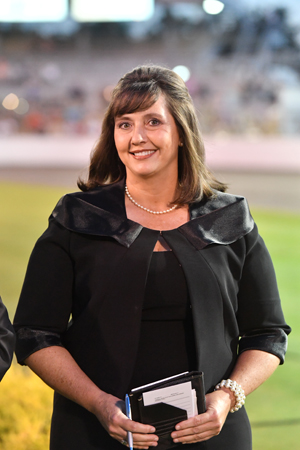
Bingham brings with her an extensive understanding of the SHOW HIO rulebook and great knowledge of the technical aspect of judging.
“The last couple of years we’ve really worked hard to clarify and expand the rulebook,” she said, explaining the Celebration judges and rules committees work closely with one another (she is a member although has removed herself during the timeframe of the horse show and weeks leading up to it). “There are technical aspects to judging the Celebration. It’s like putting the pieces of a puzzle together. One of the things that makes any judge successful is the judge who can pull those pieces together, look at the overall presentation as well, and be able to sort through all quickly and make a good decision.”
A tremendous amount of effort goes into selecting the judging panel for our World Championship show, with several factors including a potential candidate’s knowledge of the rules, their experience, where they are located, and their experience in halter, pleasure and performance divisions.
“We also want to mix new faces with some of our more experienced judges to continue to develop a deeper judging pool for all shows to pick from in future years,” Inman said.
After Bingham, Landrum has the second most number of Celebration judging experiences under his belt, having marked the cards three times (1980, 2014 and 2015). Most recently he judged the North Carolina Championships in the fall of 2016. Most people in the industry know Landrum for his long-term experience in the industry as both a trainer and a leader. Also a politician and business man in other capacities beyond horses, Landrum brings with him a keen sense of leadership and comfort in his role on the team.
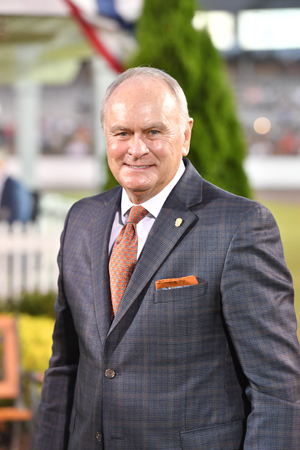
“This is my fourth time to judge the Celebration and I consider it a real honor to be asked to judge it,” Landrum said. “What makes for a successful Celebration judge — or being successful with anything in life — is caring about what you’re doing. I truly care about the walking horse and the industry. If you’re doing what’s best regardless of if it’s business, personal life or something else, if you care and are doing what’s right it usually works out and you can sleep better at night as well.”
Landrum said he predicts a great Celebration and offered insight that this year’s panel will be highly scrutinized and expected to perform well, a mission he believes they will accomplish due to the balanced combination of variety in terms of backgrounds and experience. He said he has great respect for his fellow judges and the job in front of them.
“It’s so important that we as judges adhere to the guidelines of the SHOW rulebook,” he said. “Whatever the guidelines of a class are we have to go by those rules. The people showing in front of us have worked their tails off to get where they are and it’s important we respect that when judging. To do that we have to know the rules and do our homework.”
Chris Bobo is also experienced as a Celebration judge and this year makes his third time on the panel, having previously judged in 2012 and 2016. Bobo also judged The International in 2008 and has judged the Spring Fun Show in 2013 and 2014 and Tunica in 2013. This year, he marked the cards for Christmas In July as well as Pulaski.
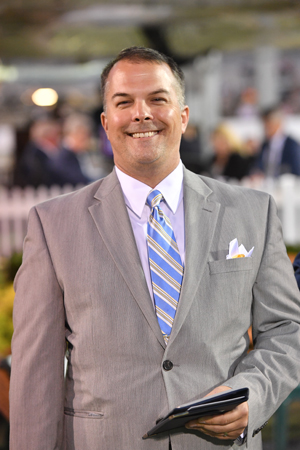
In a nutshell, Bobo has a well-rounded résumé and unique perspective on many levels. A former trainer himself, he’s grown up in the industry as also the son, grandson and nephew of industry greats. He’s been active not only as a trainer, but has also been active in the industry.
He currently works for the United States Postal Service but has remained active in other ways, such as his involvement with the TWHBEA executive board, making him a diverse candidate who is knowledgeable and well-respected. He’s done this job more than once in addition to judging many other one night and multi-day shows.
Bobo said he’s excited and energized for the upcoming challenge, a challenge he said that’s physical, mental and emotionally draining. He made the career change from training to the postal service about four years ago, but said his life-long experience in the horse world as both a trainer and a judge has given him different perspectives on the entire judging experience.
“From the training background, whether it’s because I loved a particular horse or because I worked so hard with that horse, sometimes it’s a disappointment when that particular horse doesn’t win,” he explained. “The judging aspect gave me a totally different perspective … I got into judging because I know horse standards and I wanted to make a difference. It was an eye-opening experience at first because you quickly get a different perspective and realize how really good judges must pay attention to all the details of each horse and also the whole class at large.”
Doing it well requires fresh eyes, rest and rejuvenation. “The physical aspect of the job is tough, especially in the morning and when the heat has increased,” Bobo said. “But I think the emotional aspect of the challenge is sometimes overlooked. When I trained horses and was in the show ring, or when I’ve judged, when I get home from the morning session for the break or home from the evening session and the day is over I am 100 percent charged up with adrenaline and ready to go. It’s hard to shut down, so trying to keep that balance can be difficult.”
All of the experienced judges agreed with Bobo’s advice to the less experienced judges on the panel, which is to get rest, eat well and stay hydrated.
“For me, even getting a little outside activity like going for a walk when I can helps me to stay in balance and reset,” he said. “All those little things help.”
Brooks and Reel are the two newcomers to the job, and having newcomers is an intentional part of creating that ideal balance among the panel. In fact, having newcomers combined with those with moderate experience and those with extensive experience is a must for the 11-day job that pays a well-deserved $15,000 a piece, Inman said.
While this is both Brooks and Reel’s first Celebration gig, both have judged Tunica, which is basically a requirement for anyone wanting to be considered for the job.
“The key thing for all five judges is the reason they’ve come up the ladder and taken the route they have is because they’ve judged, and done a good job judging, at Tunica, the Fun Show, or both,” Inman said.
Brooks was in Shelbyville during the Spring Fun Show, where the careful evaluation process of him as a potential judge began.
Could he get his cards turned in quickly? Could he work well with others on that panel? How consistent were his cards with the other judges on the panel? Newcomers to the Celebration panel are considered carefully before earning the job, and in Brook’s case not only did he perform at the Spring Fun Show, but he performed well.
His experience with the horse is mainly centered around the performance horse. He’s been training since 1996 and also stays busy as a husband and father of two boys.
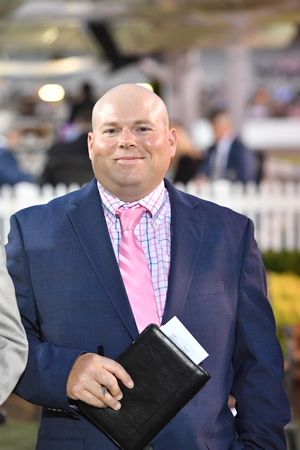
“I am excited and honored to be judging,” Brooks said. “It’s the highest level of judging you can obtain in this industry and it will be different than what I’m used to ... I guess I’m a little different than the others on the panel in that I still train horses every day and show every weekend. I know what it’s like to be on the other side (training), in the trenches, and what it’s like to go through the process.”
Last but certainly not least, Reel also brings a different perspective. Laid back and relaxed about the upcoming new challenge, Reel hails from Virginia but knows the horse well. He’s very well-versed with all disciplines of the breed and trains many horses for clients in both flat shod and performance, giving him a lot of credibility among exhibitors.
Reel, who has judged Tunica twice and also Asheville, another large show, is geographically speaking farthest away from Shelbyville of anyone on the panel, and that distance actually served as another asset for him from the perspective of those doing the hiring.
Reel, who has lived in Virginia since 1987 and east Tennessee before that — training both flat shod and performances horses for 25 years — not only offers a fresh face to exhibitors, but the fact that he’s not actually from the middle Tennessee region allows horses to look fresh to him as well. He doesn’t see the horses who will be showing in front of him often, and that, in addition to his balance as a trainer, made him a standout.
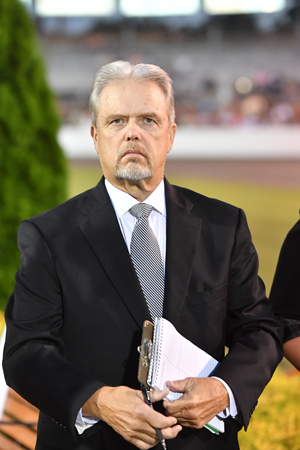
“Even though I’ve judged several major shows in major states such as Asheville, which has 850 entries over three nights, I think me being from Virginia offers a unique perspective,” said Reel, adding he’s feeling very prepared and at ease about the upcoming task at hand. “It’s a new challenge but I don’t look for any of it to be terrible or something I can’t do. From what I’ve been told the biggest physical challenge is the weather if it gets too hot, but hey, we work in a lot of heat up here as well so I’m not really worried about that.”
Hand-picked to provide both skillful and diverse eyes to evaluate the contenders who make the gate, this year’s judges are expected to meet and exceed expectations. There will be many challenges over the 11 days ahead of them; some of those challenges are obvious and others not so much. Contending with the heat, schedule and lighting are all a given, but judges must also be mentally sharp and emotionally grounded.
Bingham and Bobo reiterated Landrum’s emphasis on knowing the rulebook to a point of comfort and second-nature. In order to give each horse a fair shake, judges must know exactly what each division calls for so they can effectively and efficiently evaluate each entry.
Bobo also said knowing the rules is a must to stay on track and suggests first-time Celebration judges have a “cheat” pad that lets them know what class it is, what the gaits are for each class that they’ve studied but can also refer to at quick glance before each class begins.
Mistakes are bound to happen, all agreed, but it is imperative for judges to be able to shake off the dust and move on quickly if a mistake is made to ensure they get back to the task quickly.
“The first thing you have to remember is each class is a new class,” said Landrum, who retired from officially training horses several years ago. “Any given entry doesn’t care what happened in the class before it or what’s going to happen in the class after it. Every class is a new class and it’s a chance for someone to win a world title, and I respect that.”
Bingham agreed, explaining her experience is likely her best asset for that very reason — remaining calm under pressure and treating each class as its own, regardless of what may have happened in the previous class.
“I’m not easily rattled,” she said. “I have that consistent personality, and not that I don’t have fun, but when it’s time to make a decision I have the experience and demeanor to do it … As judges, we’ve all made mistakes, things like we’ve forgotten to move one up or down on the cards. An inexperienced judge will let mistakes rattle them. My advice is not to let mistakes ruin the rest of your night.”
Bobo echoed that sentiment and stressed the importance of judges being mentally sharp and quickly able to move on from one class to the next.
“If you’ve ever judged and are still judging eventually you are going to make a mistake,” said Bobo, whose father is Bill Bobo, grandfather is CA Bobo and uncle is Charles Bobo. “You can’t let it bother you. You have to snap out of it and clear your head to the best of your ability, learn from the mistake quickly without stewing over it and messing up your evening. There are plenty of opportunities to make up for any given mistake and the next class deserves your attention.”
Many experienced judges are quick to point out how different the job of judging large classes is from the viewpoint of center ring compared to sitting in the stands. Quite simply, horses look different from center ring. They come at you fast, pass by you quicker, and add the challenge of catching back numbers in sometimes difficult lighting that creates a glare that makes simply reading the numbers easier said than done.
The Celebration pays close attention to the tiny details, such as even the fonts of the numbers on the backs of riders, to ensure judges will be able to see the numbers as clearly as possible. One year, they used a font that, combined with the glare from the lights, made it nearly impossible to differentiate the number “3” from the number “8.”
“One of the biggest challenges of judging the Celebration that people don’t realize is making sure you have your numbers right,” Bobo said. “Sometimes the lights play tricks on how the numbers look and you really have to pay specific attention.”
Also, everything looks totally different from center ring, Inman said. “It’s a whole lot harder to see a number that’s way above you compared to looking at them from the stands.”
Each year, as sort of a fun and interactive part of the show, the Celebration invites special guests judges to come in an evaluate entries.
“That was one of the best things the Celebration has ever done,” Bingham said. “Let me tell you, when they go to the line-up they are shaking. They all say, ‘wow, I had no idea it would be that hard.’
Furthermore, she explained, it’s pretty reasonable to pick out the winner of the class, or even the top two or three, but getting third through 10th place tied is a different story. Do that, and doing it fast enough, is the hard part.
“We’ve all been guilty of this and I used to do it myself, back before I was a judge,” she laughed. “I’d sit in the stands and be able to pick out the winner and often I was in line with the judge, but you forget to tie the rest of the class.”
The judges working as a team is an imperative part of having a successful Celebration, but the team goes beyond the panel of five. Many others working from center ring and other parts of the ground provide critical value to ensuring the show flows just right.
Perhaps one of the most important parts of that team is the ringmaster. They are the right-hand man to the judges, especially the call judge, providing a set of extra eyes at any given time and not having one with experience makes all the difference.
“It’s an underrated position for sure,” Inman said.
“You probably work closest with the ringmaster when you’re the call judge, and the Celebration ringmasters are so good,” Bingham said. “They help you so much. Basically, you (the call judge) start your class, pick a horse out and tell the ringmaster, ‘when that horse hits such and such a spot make sure I change gaits. They keep you in rhythm.”
They also keep the judges safe; watching out for any rider who might be in trouble as well.
“They might see something you can’t and tell us, ‘watch out for the horse going through the grass,’” she said. “When you’re judging, you can’t turn your back on the horses you are watching so the ringmasters basically have your back. They also double check your numbers before you turn in your card. They also walk the line up for us and if they see any issues they will have the call judge walk the line up. They save us a lot of steps.”